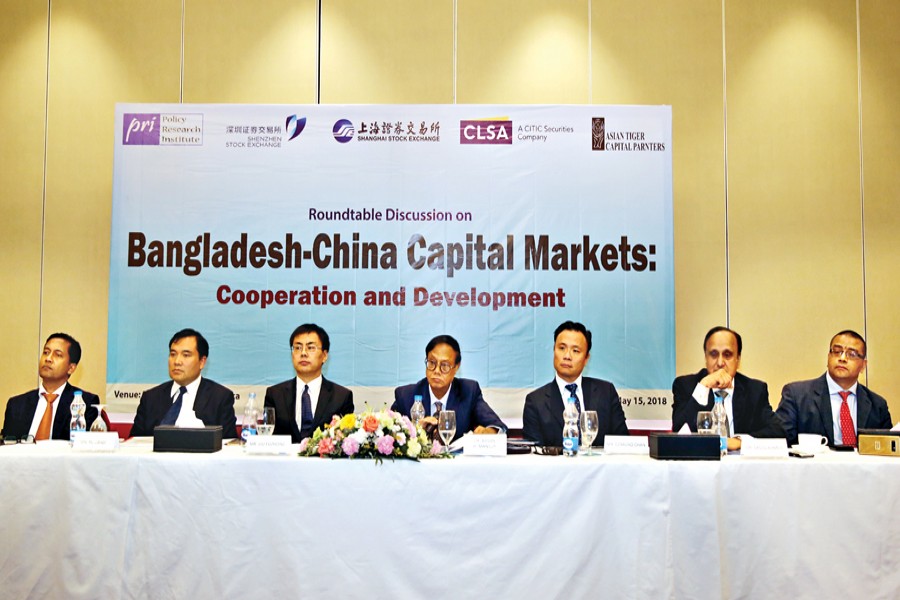Sino-Bangladesh cooperation will help revamp the country's ailing capital market that has failed to keep pace with the development in other areas of the economy, economists and capital market experts said.
Speaking at a roundtable, they said the signing of the partnership agreement between the consortium of Shenzhen-Shanghai Stock Exchange and the Dhaka Stock Exchange would play a pivotal role in bringing momentum to, and restoring investors' confidence in, the country's capital market.
The roundtable on 'Bangladesh-China capital markets: Cooperation and development,' was jointly organised in Dhaka Tuesday by the Policy Research Institute (PRI) of Bangladesh and the Shenzhen and Shanghai Stock exchanges in Dhaka of China.
Addressing the discussion, Pan Xuexian, chair of Supervisory Board of the Shanghai Stock Exchange said that sustainable development cannot be possible without a vibrant capital market.
Through sharing experiences and technology both China and Bangladesh can benefit from developing their respective stock markets, he added.
He underscored the need for including infrastructure projects in the capital market, saying that in China such projects have a strong presence in the market.
Salman F Rahman, private investment affairs adviser to Prime Minister Sheikh Hasina, said the signing of the cooperation deal between the DSE and the consortium of Shenzhen-Shanghai Exchanges was a "breakthrough" in strengthening the capital market, which has been showing disappointing performance in the last decade.
"In the last one decade, when the country's economy was growing in a stunning pace, our capital market's performance was very disappointing. Many people were talking but there was no action and nobody knew how to get things right," he said.
"One of the reasons was the lack of understanding. Investors, regulators -no one understood the market. And there was suspicion. Whenever an initiative was taken people started suspecting that there was something shady behind it," he said.
Terming the lack of depth in the market the biggest problem, Mr Rahman said that this happened due to the absence of sound institutional players in the market.
The market is being driven by the retailers whereas in strong capital markets institutional investors call the shot, Mr Salman, who is also former president of the Federation of Bangladesh Chambers of Commerce and Industry (FBCCI), noted.
Vice Chairman of the PRI Dr Sadiq Ahmed said the collaboration between the stock exchanges of two countries was the beginning of a long-lasting cooperation on sharing of knowledge, experience and financial resources.
Bangladesh is in a position to gain much more through this partnership considering the enormity of China's economic strength, he said.
China today is one of the largest global economies and also the number one exporting country, he noted.
President and CEO of Shenzen Stock Exchange Wang Jianjun said that the partnership has been made in line with the Chinese policy of development cooperation among the Belt and Road countries as a vibrant capital market is crucial to the economic development.
This partnership will play an important role in mobilising financial, social and technological resources, he said, adding that to promote the market, financial innovation is essential and they would concentrate on that.
Highlighting Bangladesh's economic development since its inception, chief economist of the Bangladesh Bank Faisal Ahmed said from a low income country in 1971, Bangladesh has emerged as a lower middle-income country today.
"In the 90s when the world was experiencing recession, only two countries achieved growth in HDI (human development index)- Bangladesh and China. In Bangladesh, bottom up growth raises national savings, which is higher than many peer countries," he said.
Dr Ahsan H. Mansur, executive director of the PRI, welcomed the partnership between China and Bangladesh on the stock market development and said there should be a clear roadmap on the market development strategies from both sides.
And these strategies should be devised through detailed research and planning so that it can fit into the requirements of the market.
Liu Fuzhong, director of international department of Shenzhen Stock Exchange, said maintenance of fairness and integrity was vital to restoring confidence of the investors in the market.
Ifty Islam, chairman of AT Capital, said Bangladesh's capital market has considerable potential to grow.
Stressing the need for technology transfer from the Chinese stock markets, he said despite high mobile phone penetration, only 20 to 30 thousand people were engaged in share-trading through mobile phones but in China the number is quite large.
"So we can take their assistance in popularising such trading," he said.
mirmostafiz@yahoo.com


